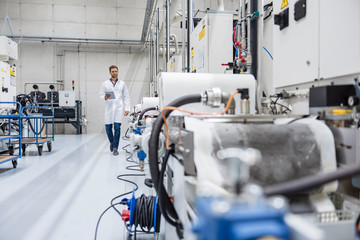The manufacturing industry has long been at the forefront of technological innovation, constantly evolving to meet the demands of a globalized economy. In recent years, one of the most transformative technologies to impact this sector is Artificial Intelligence (AI). From automating routine tasks to optimizing complex processes, AI is not just a futuristic concept but a present-day reality that is reshaping the manufacturing landscape. The benefits of AI in manufacturing are extensive, ranging from increased efficiency and cost savings to improved product quality and enhanced innovation. This article delves into the myriad advantages of AI in manufacturing, exploring how it is revolutionizing the industry and setting the stage for a new era of industrial growth.
Enhanced Efficiency and Productivity
One of the most significant benefits of AI in manufacturing is the dramatic increase in efficiency and productivity. AI-powered systems can process vast amounts of data at lightning speed, enabling manufacturers to optimize their operations like never before. For instance, predictive maintenance powered by AI can monitor the condition of machinery in real-time, identifying potential issues before they cause costly downtime. This not only reduces unplanned maintenance but also ensures that equipment operates at peak efficiency, thereby maximizing productivity.
Moreover, AI-driven automation can handle repetitive tasks with precision and speed, freeing up human workers to focus on more complex and creative aspects of production. This combination of human ingenuity and machine efficiency results in a more agile and responsive manufacturing process, capable of adapting to changes in demand or market conditions with ease.
Improved Product Quality
AI is also playing a crucial role in enhancing the quality of products. Through advanced analytics and machine learning algorithms, AI can detect defects or anomalies in the production process that might go unnoticed by the human eye. This ensures that only products meeting the highest quality standards reach the market, thereby reducing waste and minimizing the risk of recalls.
In addition, AI can be used to optimize the design and development of products. By analyzing data from past projects and simulations, AI can provide insights into potential improvements in design, materials, and manufacturing processes. This not only accelerates the development cycle but also leads to the creation of superior products that meet or exceed customer expectations.
Cost Reduction and Resource Optimization
The ability of AI to reduce costs is another compelling benefit for manufacturers. By optimizing processes and reducing waste, AI helps manufacturers make the most of their resources, whether it’s raw materials, energy, or labor. For example, AI-driven supply chain management systems can predict demand with high accuracy, ensuring that materials are ordered just in time, thus reducing inventory costs.
Furthermore, AI can optimize energy consumption by analyzing usage patterns and identifying areas where energy can be saved. This not only cuts costs but also supports sustainability initiatives, making manufacturing processes more environmentally friendly.
Innovation and Customization
AI is a powerful tool for driving innovation in manufacturing. By harnessing the vast amounts of data generated during production, AI can uncover new insights that lead to innovative products and processes. For example, AI can analyze customer feedback and market trends to identify emerging needs and preferences, enabling manufacturers to develop new products that meet these demands.
Moreover, AI facilitates mass customization, allowing manufacturers to produce tailored products on a large scale. Through advanced algorithms, AI can manage the complexity of customizing products to individual specifications without compromising on efficiency or cost-effectiveness. This ability to offer personalized products enhances customer satisfaction and provides a competitive edge in the market.
Enhanced Safety and Working Conditions
AI also contributes to safer working environments in manufacturing. AI-powered robots and automation systems can take over dangerous tasks, reducing the risk of injury to human workers. In addition, AI can monitor working conditions in real-time, identifying potential hazards such as equipment malfunctions or environmental factors that could compromise safety.
Moreover, AI-driven wearable technology can monitor the health and well-being of workers, providing alerts if there are signs of fatigue or other health issues. This proactive approach to safety helps prevent accidents and ensures that workers remain healthy and productive.
Streamlined Supply Chain Management
The integration of AI into supply chain management is transforming the way manufacturers manage their logistics and inventory. AI algorithms can analyze vast amounts of data from suppliers, production facilities, and customers to predict demand with high accuracy. This allows manufacturers to optimize their inventory levels, ensuring that they have the right amount of materials at the right time without overstocking or understocking.
AI can also identify potential disruptions in the supply chain, such as delays in shipments or changes in supplier availability, allowing manufacturers to take proactive measures to mitigate these risks. By streamlining supply chain management, AI helps manufacturers reduce costs, improve efficiency, and maintain a steady flow of production.
Sustainability and Environmental Impact
Sustainability is becoming an increasingly important consideration in manufacturing, and AI is playing a crucial role in helping manufacturers reduce their environmental impact. AI can optimize energy usage, minimize waste, and improve resource efficiency, all of which contribute to more sustainable manufacturing processes.
For example, AI can analyze data from production processes to identify areas where energy consumption can be reduced or where materials can be recycled or reused. This not only helps manufacturers meet regulatory requirements but also enhances their reputation as environmentally responsible businesses.
Moreover, AI can help manufacturers design products with sustainability in mind. By analyzing the environmental impact of different materials and production methods, AI can suggest more sustainable alternatives that reduce the carbon footprint of the products.
Conclusion: Embracing the Future of Manufacturing with AI
The benefits of AI in manufacturing are clear and compelling. From enhancing efficiency and productivity to improving product quality, reducing costs, and driving innovation, AI is revolutionizing the way manufacturers operate. As AI technology continues to advance, its impact on the manufacturing industry will only grow, creating new opportunities for growth and competitiveness.
However, to fully realize the potential of AI, manufacturers must embrace a culture of innovation and invest in the necessary infrastructure and skills. By doing so, they can position themselves at the forefront of the AI revolution and reap the benefits of this transformative technology.
FAQs
1. What is AI in manufacturing?
AI in manufacturing refers to the application of artificial intelligence technologies, such as machine learning, predictive analytics, and robotics, to optimize manufacturing processes. This includes automating routine tasks, improving product quality, enhancing efficiency, and driving innovation.
2. How does AI improve efficiency in manufacturing?
AI improves efficiency in manufacturing by automating repetitive tasks, optimizing production schedules, and enabling predictive maintenance. This reduces downtime, ensures that machinery operates at peak performance, and allows human workers to focus on more complex tasks.
3. What role does AI play in product quality?
AI plays a crucial role in product quality by using advanced analytics to detect defects and anomalies during the production process. It can also optimize product design and development, leading to higher-quality products that meet customer expectations.
4. Can AI help reduce manufacturing costs?
Yes, AI helps reduce manufacturing costs by optimizing resource usage, reducing waste, and improving supply chain management. AI-driven systems can predict demand, optimize inventory levels, and reduce energy consumption, all of which contribute to cost savings.
5. How does AI contribute to innovation in manufacturing?
AI contributes to innovation in manufacturing by analyzing data to uncover new insights, enabling the development of innovative products and processes. It also facilitates mass customization, allowing manufacturers to produce personalized products efficiently.
6. Is AI in manufacturing safe for workers?
AI enhances safety in manufacturing by taking over dangerous tasks, monitoring working conditions, and providing real-time alerts to prevent accidents. AI-driven wearable technology can also monitor worker health, helping to ensure a safe working environment.
7. How does AI impact sustainability in manufacturing?
AI supports sustainability in manufacturing by optimizing energy usage, minimizing waste, and improving resource efficiency. It also helps design products with sustainability in mind, reducing the environmental impact of manufacturing processes.













